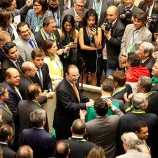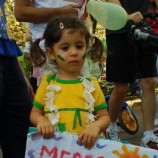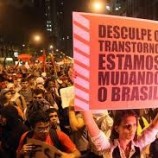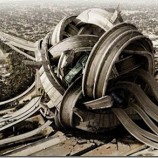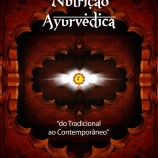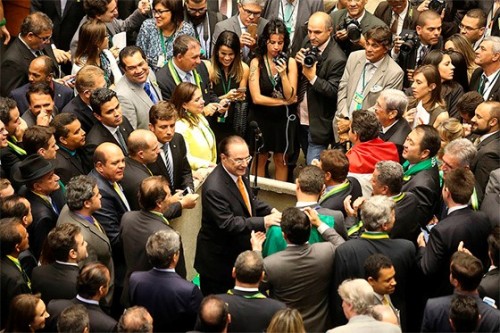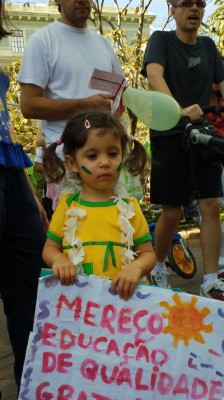Gabriel Guedes is a musician, an aviation pilot and a Luthier as well. Son of musician Beto Guedes. He has a passion for aviation, started out making airplane models and today he crafts guitars and bandolins. In 2004 he recorded an album interpreting ‘chorinhos’ music from his grandfather Godofredo Guedes, Choros de Godofredo. At the moment, he is in the process of launching his second album, now of his authorship.
How did your relationship with music begin?
Ever since I was little, musical instruments were always spread all around the house and my father had his record player. We would listen to the Beatles a lot. We’re big fans of the Beatles. I would memorize their songs and try to repeat the sounds. I started to nose around the instruments. When I was ten, I started to learn the first notes and who taught me was Pato Hendrix. Then I wen to studying at home by myself.
There was a girl whose little boyfriend I wanted to be so much that I would imagine myself playing the instrument and showing myself off to her, to see if she wanted me to be hers. I think that influenced me a lot, wanting to win over girls by playing an instrument (laughs).
Does it still?
I guess so. Of course it’s more conscious now because we are maturing overtime. This thing of wanting to win over people is totally our ego, isn’t it? But damn, we are human beings, what can you do? If we were born in India, then we would have more adequate spiritual guidance, but we’re in the Western world, right?
Does your music have some relationship with spirituality, with the sacred?
Yes it does. When I was 18 I started studying Spiritism and now I have a very deep interest in Hare Krishna and Srila Prabhupada. Krishna was God Himself in human form incarnated on Earth, according to the Bhagavad Gita, which is a sacred scripture over 5 thousand years old. Even before tipping my toes in Hare Krishna, when I was 18 I started listening to Bach. The first wave that hit me was the Concert for Brandeburg number 3 in G Major. Then I went on researching, listening more and more when I saw that Bach wrote in the end of his music sheets: “To God”. I would try to assimilate the perfection of music and started to see perfection in nature as well, in every sense of the word. In the micro-organisms, in how the Earth renews itself, biologically, how the human body was so well engineered, despite being so fragile. So I went on connecting the dots and I arrived at the conclusion that music is a way to glorify God, Krishna. Seeing this in Bach’s music, how he would compose them to perfection, I clearly felt the presence of something much higher, which we don’t have eventhe slightest notion of what that may be. Music shapes the human character and helps us focus on a spiritual path. Not just any music. You’re not going to raise your consciousness by listening to a carioca funk song. I heard Ravi Shankar saying that you can glorify God and find a spiritual way through the Ragas, in Gospel music, even in the hymns of other religions. The word of God is so worn out that everyone thinks that God is someone’sproperty, that Jesus is God. From my point of view all of them are a very developed part of Krishna. But getting back to music, I think that it really does provide a spiritual deliverance so that we can have a wider vision than we habitually do on this planet. It opens a very extensive range and gives us a notion of how far we still have to go to evolve, to not incarnate on this planet anymore to see that we are half asleep for not doing everything we can thinking it’s serving God.
Do you believe that music today can have a social and/or environmental function? How?
It’s funny, you just said something that it totally integrated in what we were saying before. Spiritual growth leads to social awareness. For as much as in the 70’s there was this general awareness, nowadays we may need it even more because consumerism is so much more veracious now and there are so much more people in the world than there was 30 years ago and capitalism has come to such an inhuman point that maybe the need for social awareness it greater. Today the planet is being much more consumed than at that time, however, most people just don’t give a damn! The great masses are sleeping. A lot of people go to church, repeatthe usual words without digesting what is being said. I find the words of Jesus too beautiful to be monopolized, profiteered, to delude peoplesaying that their church is the only way to take us to God. People swallow anything without question and reproduce what was said instead of digesting it and expressing what they really understood.
How do you see contemporary Mineira music in the independent scene?
I see a lot of interesting stuff in the independent scene. A lot of silly stuff too, there’s always been right, it’s natural. There’s Rafael Martine, a great composer and arranger, there’s Cleiton Prospere who is a composer from Três Pontas, sings beautifully, plays piano beautifully, there’s Rodrigo Borges who has a super great album, a jewel!
What has changed in the music made by Clube da Esquina years ago and the music being made today?
My friends forgive me, but before it was all aboutthe discovery, harmonic shifts, esthetics, music was made unpretentiously, but sounded so original. Today there’s a crowd that I find interesting, but nothing new. I include myself in this crowd. Everything we do is with the sensation that someone has already done it before. It’s not like listening to Milton Nascimento’s Cais, or Céu de Brasília by Toninho Horta, or Choro de Mãe by Vagner Tiso, or Nenhum Mistério do Lô Borges, or my father’s Dona Júlia. I listen to the songs of today and I can’t find anything in them that quenches my thirst for music. So I listen to today’s music for enjoyment, but when I want to quench my thirst, I go to the orchestras.
What is lacking?
That is a question that I don’t know how to answer. I think that we have to contribute with what we can. Before I thought that after hearing Johann Sebastian Bach I just had to shut up and listen. For I while I was blocked. Now I discovered that I’ve become a music making machine. I have a pile of ideas, wanting to make a bunch of albums. Some are more electronic songs, club music. I have the idea to make analbum and call the sons and daughters of artists whom I like and know, like Gabriel Sater, Maria Rite, Chico Teixeira, Renato’s son, Diana Poppóf, Yuri’s daughter. Call the sons and daughters of musicians from my generation, so that we can interact. Make homages to the musicians of Belo Horizonte, make analbum for kids.
Tell us a little about your new work.
It’s being made face-first and with courage, without any law abiding project, so to speak. All of the songs are mine. I made the arrangement for the string instruments; I personally recorded most of the instruments. On one track I managed an extraordinary feat: I gathered the entire Clube da Esquina, I am Beto Guedes’ son. On this track my dad sings, so does Lô Borges, Flávio Venturini, Milton, Tavinho Moura, now I just have to get Toninho Horta in the lasso for him to sing. I am finalizing it now, I hope I make it! Because there’s no more money to mix it, to master it, or copy, or anything!
What’s this album called?
Off the bat it’s just going to have my name on the cover, it’s going to be untitled.
Is it predominately instrumental?
There are fifteen tracks, three are sung. One I made for my oldest daughter, Júlia, it’s sung by Marina Machado and Milton. The other is called Estrela Cadente, I sing the entire melody, but in the end there is part sung by the gang at the Clube. And the last song is featuring a friend of mine who lives in Holand, Jasmim Godoy. I made the first part of the song and she made the melody, the lyrics and sings. She’s a 17 year old girl who sings so beautifully. Amazing!
And what instruments do you play on the disk?
Good lord! Let me see, I made the arrangements for the stringed quartet, there’s a few tracks where I played all the instruments, others had some guest participations. I played the pianos, the electric guitars, bass, drums, sitar, flute, trumpet, saxophone, violin, flugelhorn, tampura, which is an Indian instrument. There is participation by musicians like Neném, on percussion, Enéas Xavier, and Vagner Souza on trumpet, who did an incredible solo. There’s a song that I did inhomage to Milton and ends in homage to Bach which is more orchestral. It shifts from one to the other, but maintains within the same harmony. There’s a song in homage to Toninho Horta, who is the king of a style called Valsa Mineira, played a lot in Minas Gerais, which is the song’s title. There’s a song called Rumba meu Boi, which is the opening track.There are some jingles on piano and orchestra. There’s one song that I made for my daughter, Lira, which is an instrumental where Toninho Horta plays electric guitar, it came out amazingly, it was a great honor for me. There’s another song called Nina that I made for an ex-girlfriend who kicked my butt out the door one day. A super cool jingle that my daughters participated in. My nickname is Xexéu and this jingle is called Não acredite no Papai Noel, Acredite no papai Xexéu. It’s in homage to the Clube da Esquina which completes its 40th anniversary this year, because ever since I was a kid I’ve loved their music, I’ve been subject to their influence since childhood. There’s a part in the end that’s kind of an electronic – drum n’ bass with a Mineiro kind of harmonia to it, very different. The last track is a transposition that I did from a piece by Bach for the cello, which is a well-known prelude in G major, very popular. Who ever said that Bach isn’t popular, right? So I made the transposition to bandolin. Just bandolin.
For the reader who is no doubt hoping to listen to thisalbum, how do you resume this project as a whole?
This new album is a mosaic of musical phrases from my musical life experience. There are many different styles: orchestral waltzes, waltzes that are more pop, rumba, electronic music, pop music, jingles, there are a bunch of styles. It’s not analbum I made while thinking market-wise. There is a phrase by Bach which I love: “I can’t be unpleased if people do not like my work, because I write for my own pleasure”. I made this album for myself. I am an on-duty music maker. This work does not satisfy the capitalist, market-wise requisites.
Related Articles








